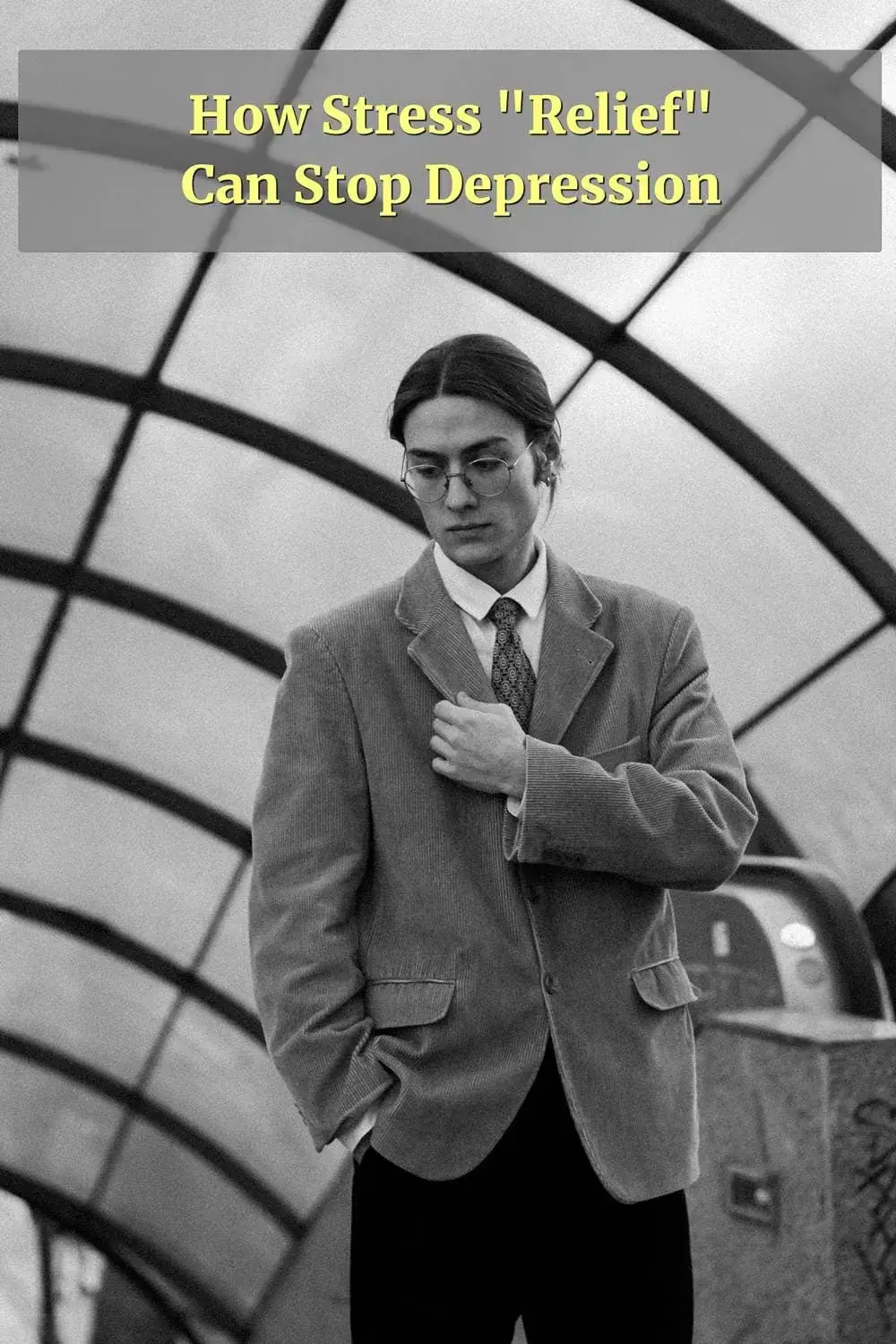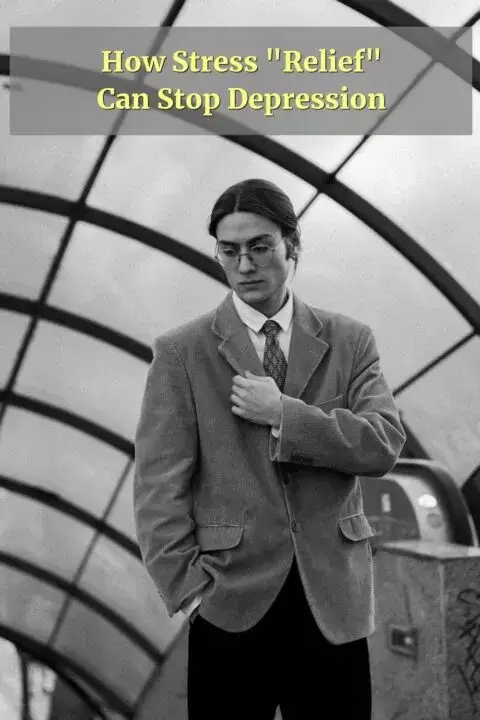Today's Thursday • 10 mins read
— By Dr. Sandip Roy.
Stress is a constant in our lives, like an alarm clock we can never seem to find and turn off. So, the key to stress-free living isn’t about trying to escape stress, but recovering from it.
The same stress can trap some people into worry and negative thinking, but let others become more resilient. The secret of this second group may be knowing how to use the “relief” system.
“Relief” is the good feeling that we have after a difficult experience or stressful situation.
Let’s find out why and how we use the “relief” system to prevent depression.
Decoding The Brain After Stress
Did you know zebras face constant, life‑threatening danger because their stripes make them easy to spot?
Dr. Robert Sapolsky, who has extensively studied the effects of stress in both animals and humans, says zebras face constant threats from predators. But their response to the acute stress of life-or-death situations only lasts a few minutes.
They don’t dwell on the danger. Once the threat passes, they quickly return to a calm, relaxed state and recover rapidly. That quick recovery is why, Sapolsky says, they don’t get ulcers.
By contrast, humans can stay stressed for days or even weeks.

Recovery from the stress phase is something humans struggle with. We often hold on to stress for much longer than necessary.
Over time, this reluctance to return to normalcy can seriously affect our mental and physical well-being.
This chronic stress, fueled by high cortisol levels in the blood, increases the wear and tear on our bodies and brains. It makes us more prone to diseases like heart disease and diabetes, and can even speed up our aging.
So, how can we manage stress like zebras using our natural stress relief system?
Yes, we can.
Studies show that stress can trigger depression in some people and resilience in others. This second group might be using their “zebra-like” skills. They are using the “stress relief” system after a stressful situation to calm down.
Now, imagine a deer that escapes a chasing cheetah, and is now peacefully grazing on grass—that’s “relief.”

Stress, V(i)TA And Dopamine
Stress is a psychological stimulus that demands our brain to respond. It’s rare to feel body stress without also feeling mental stress.
- Stress activates a region in our brain called the ventral tegmental area (VTA).
- The increased VTA activity, which naturally happens after stress, gives us a wave of relief.
- The activated VTA releases dopamine, a neurochemical that’s linked to pleasure and reward.
The dopamine surge after a stressful event is not merely about pleasure; it marks a shift from a state of alertness (“fight or flight”) to one of relief and recovery (“rest and digest”).
This transition plays a critical role in how we perceive and process the aftermath of stress.
This research suggests that the way we experience relief could actually protect us from depression and boost our resilience (our ability to bounce back from adversity).
Researchers found that:
- Those who could handle stress without getting depressed also got more relief after the end of a physical stress experience.
- When the researchers blocked stress relief, it made the mice more likely to get depressed.
- And, if the mice got a reward after the stress, it helped them feel better.
More Than Just a Feel-Good Moment
This post-stress relief is more than just a temporary mood boost. It is a crucial element in building resilience and mental well-being.
- This post-stress surge of good feeling can play a major role in increasing resilience to future stress.
- This mechanism can also act as a psychological shield, especially helpful in keeping off depression.
So, the better we feel after stress, the less likely we are to spiral downward into depressive states when faced with negative thoughts or experiences.
Researchers believe that the reason is likely that “relief” may block the negative effects of stress hormones like cortisol.
Harnessing the Power of Relief
The potential to make post-stress “relief” better and prevent depression is exciting.
The main action plan behind using “relief” is this:
Reward yourself after a stressful experience to sustain dopamine.
Here are some things that can make dopamine stay on longer after stress is over:
1. Do A Pleasurable Activity
You have to act, not passively scroll through social media. Pick a hobby or activity you find joyful. Dance to your favorite music, get your hands busy with painting, crafting, gardening, cooking, or playing a musical instrument. Do some sports activities like fun dancing, outdoor walking, or playing with your pet or child. Spend time with a loved one. These dopamine-releasing activities also bring on an overall sense of well-being.
2. Reward Yourself Post-Challenge
Buy a small gift for yourself. Treat yourself to a favorite meal or snack. Take a relaxing bath or spa day. Take a mini-break or day trip. Give yourself a self-appreciating pat on the back.
3. Acknowledge and Celebrate
Acknowledging your efforts and successes after facing tough situations fortifies the feeling that you deserve relief. Celebrate small victories to sustain dopamine and reinforce the positive impact of relief.
4. Practice Meditation
Meditation practice helps calm the mind, reduce stress, and increase dopamine production, allowing you to fully appreciate the “calm after the storm.”
5. Exercise Regularly
Physical activity has been proven to increase dopamine levels, making it an effective strategy for stress management and mood improvement.
6. Practice Mindfulness
Being mindful means paying attention to the thoughts, emotions, and events in the present moment, without judgment.
Intentional mindfulness practice can reduce overthinking, improve emotional control, increase self-awareness, postpone stress onset, and improve resilience.
Learn and practice mindfulness exercises daily.

Benefits of Stress Relief
- Improved mood: Stress relief and positive emotional states can help improve an individual’s mood and counteract the negative effects of stress. They may feel more relaxed, content, and happy.
- Enhanced resilience: By experiencing stress relief and positive emotional states, individuals may become more resilient to future stressors. They may be better able to cope with difficult situations and feel more optimistic about their ability to handle challenges.
- Better physical health: Positive emotional states have been linked to a range of physical health benefits, including improved cardiovascular health, better immune function, and reduced inflammation.
- Improved social connections: Positive emotional states may also help individuals build stronger social connections with others. They may be more open and friendly with others, which can lead to improved relationships and social support.
- Increased creativity: Positive emotional states have been linked to increased creativity and problem-solving abilities, which can lead to greater success at work and in personal pursuits.
Of course, everyone is different – experiences, genetics, and coping strategies — so the rewards may not be the same for everyone.
FAQs
1. What is “relief”?
According to scientists, “relief” is the natural state after the end of harsh stimuli. It is the feeling of improvement or comfort that comes after experiencing something unpleasant or stressful. It is a well-conserved phenomenon that has been observed in many animals, including humans.
2. How to increase “relief” after stress?
Activities like exercise, mindfulness, and engaging in rewarding experiences can potentially influence your post-stress feelings and increase “relief”.
3. Does everyone experience relief after stress?
Everyone can benefit from this protective mechanism. But not everyone knows how to use it for good. Those who don’t are usually the ones who experience prolonged negative emotions after stress, increasing their risk for depression.
4. What are other potential applications of understanding relief?
Beyond preventing depression, understanding the “relief” mechanism could hold promise for treating other stress-related mental health conditions like anxiety and post-traumatic stress disorder.
5. What purpose does stress relief serve evolutionarily?
In terms of evolutionary purposes, stress relief is considered a natural resilience mechanism helping survival. The ability to settle in placidity after a negative experience may have helped early humans adapt to their stressful environment.
6. How does stress relief help individuals cope with negative experiences?
Stress relief provides a positive (or at least, a non-negative and neutral) emotional state at the end of a stressful event. This state can help them feel more capable of coping with future stressors and less likely to develop anxiety, depression, or overthinking (rumination).
7. What is relief-based learning?
Relief-based learning occurs when we reinforce a particular action or behavior by doing things that perpetuate the sensation of relief after a stressful, threatening, or painful experience ends. It teaches us behaviors that minimize or avoid spending excessive mental resources on negative experiences.
Example: If you learn that deep breaths or gentle massage can reduce “painfulness” after an experience of pain (say a medicine injection), you are more likely to repeat it in the future before/after a similar experience.
Dopamine, a neurotransmitter in the brain, is involved in reward processing and reinforcement learning, and its release in the brain is associated with positive emotional states. Relief at the end of a stressful or life-threatening experience can trigger dopamine release into the brain. This reinforces the behaviors or actions that were associated with the relief, making it more likely to repeat those in the future.
8. How is stress relief encoded in the brain?
(Sciency answer) Stress relief is encoded in the brain through the activation of the mesoaccumbal dopamine circuit, which projects to the nucleus accumbens shell. This circuit has separate projections to the lateral shell and dorsomedial shell, which prevent distinct aspects of depression-like behaviors. Stress relief also activates reward-related mesolimbic dopamine neurons that are responsible for making us feel good when we get a reward.
(Easy answer) There are specific pathways and areas in our brain that are responsible for making us feel good when we receive a reward or something positive happens. These areas get activated when we do things to relieve our stress and anxiety. Over time, these help prevent depression-like emotions.
Final Words
- Stress “relief” feels good, but temporarily: The brief, good feeling after being stressed out is our brain getting the reward of pleasure from its dopamine (DA) system.
- Inability to feel “relief” can lead to depression: Not feeling better after being stressed out can make us more likely to get depressed.
- Boosting “relief” can increase resilience: The better we feel after being stressed out, the better we can bounce back from stressful things in the future.
The next time you are feeling good after a stressful event, don’t take it for granted, undervalue it, or brush it away. That wave of relief is your brain doing its remarkable job of protecting you from future struggles.
It gives your emotional system an optimism and motivation boost, helping you face future challenges with greater confidence that you can cope with them.
As research continues, harnessing the power of relief may become a key strategy for building stronger, more resilient, and depression-resistant minds.
√ Also Read: 12 Behaviors That Strongly Suggest You Lack Self-Discipline
√ Please spread the word if you found this helpful.
